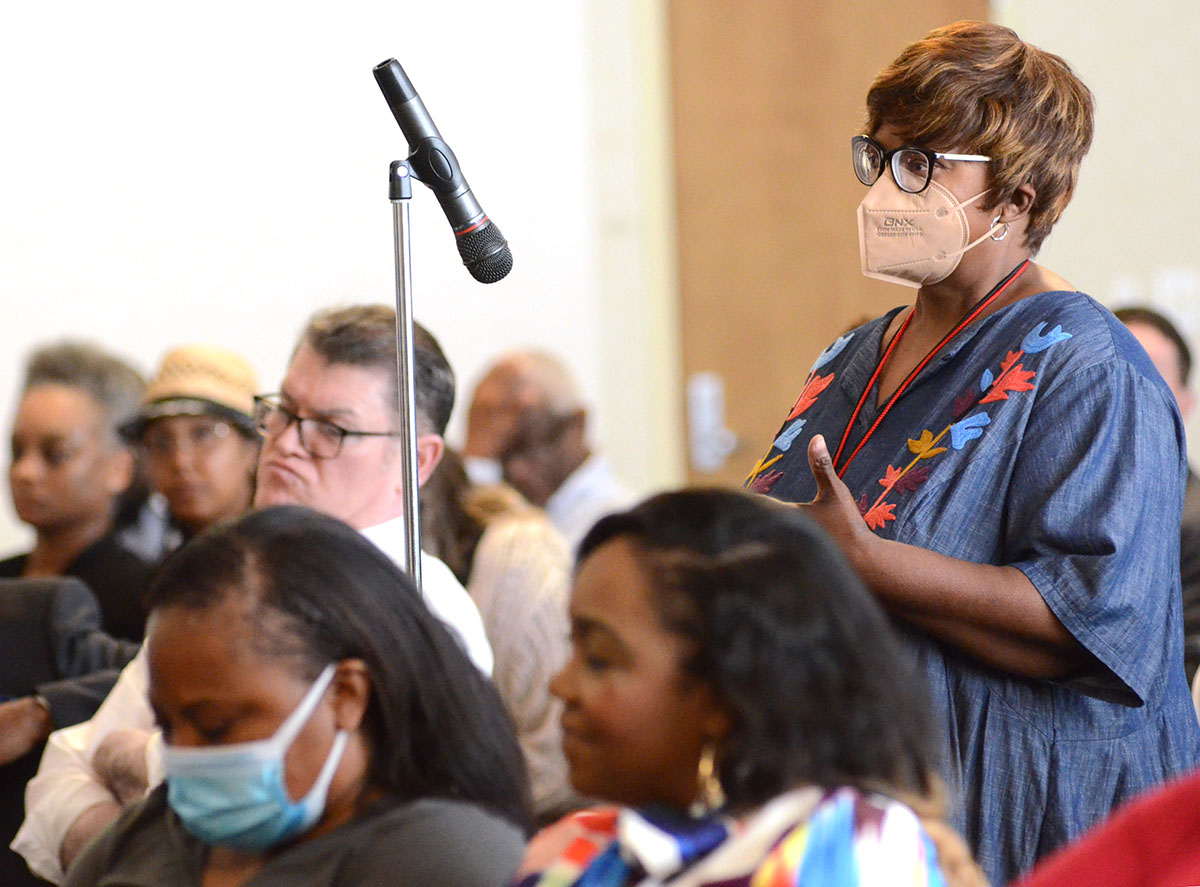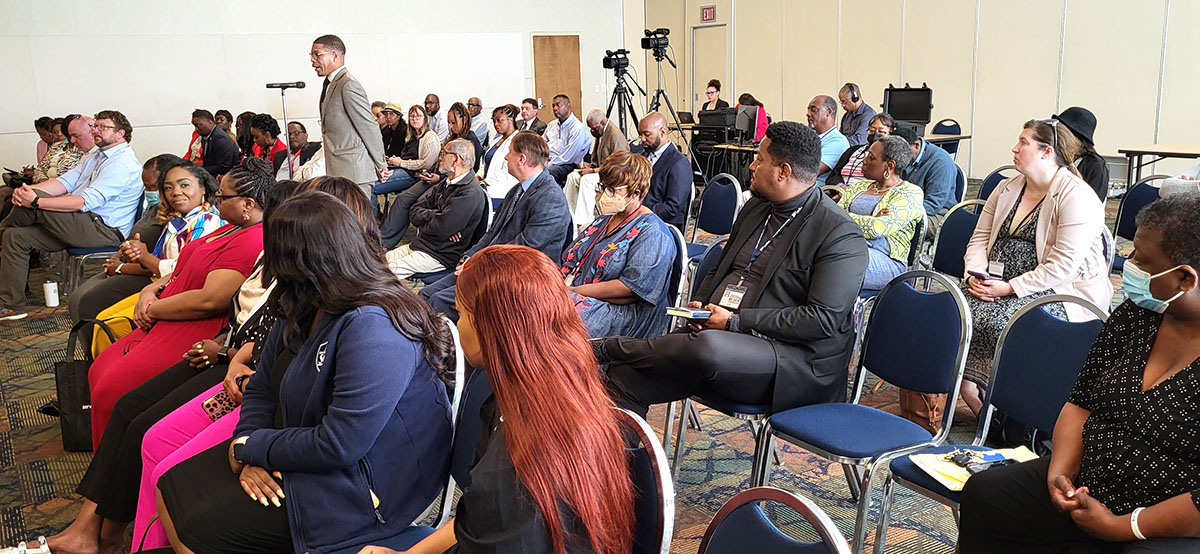Mississippi Today
‘Stop hiring your friends’: JSU community speaks up in listening session for next president

‘Stop hiring your friends': JSU community speaks up in listening session for next president
Students, faculty and staff made it clear at the listening session that the Institutions of Higher Learning Board of Trustees held on Jackson State University's campus Wednesday: Hire a permanent president whose tenure won't end in resignation like the last three.
In 2016, Carolyn Meyers resigned amid cratering finances. In 2020, William Bynum, Jr., resigned after he was arrested in a prostitution sting at a Clinton hotel.
And though nobody spoke former president Thomas Hudson's name, his resignation — for which the board still has not provided a detailed explanation — cast a shadow over the listening sessions, with many community members accusing the board of not doing its due diligence in his hiring.
Only one person mentioned he'd like to see Elayne Hayes-Anthony, JSU's temporary acting president, elevated to a permanent spot, though trustees did ask speakers not to name potential candidates as the board isn't yet at that point in the search.
Steven Cunningham, the trustee who is leading the search and the only JSU alumnus on the board, emphasized that he wants to hire a good president too.
“I'm not just here as an arbitrary member of the board,” he said during the student session. “This place means a lot to me.”
The board plans to do a national search. The listening sessions, which trustees will use to write a candidate profile, are the first step in that process. There's also a survey on IHL's website that will remain open until midnight on April 26.
Faculty and staff
The first listening session began on a low note. Etta Morgan, an associate professor in the criminal justice and sociology department, kicked it off: Morale among faculty is at an “all-time low” she said, even under the temporary administration.
“We are losing extremely good people,” she said. “Students have gotten to the point where they're cursing you out in the classroom. You write them up, nothing gets done … It's like we're being destroyed from the inside out.”
It's not just faculty at JSU who are turning over, speakers noted — so are the presidents. But not everyone at the faculty and staff session seemed to agree that presidential turnover has necessarily meant bad leadership. When Robert Luckett, the director of the Margaret Walker Center suggested that was the case, there was vocal disagreement from the audience.
“This is a level of instability that is deeply problematic for this institution.” Luckett said, adding that he had experienced “disastrous leadership” during his time at JSU.
“I wouldn't say that,” an audience member said. “That's your opinion!”
The next president needs to understand JSU is a special place in Mississippi, many faculty told trustees. Others said they felt like JSU no longer has the magic it once did.
LaKeisha Crye, an instructor and 2004 graduate, teared up as she told trustees that she didn't want to send her daughters to JSU. Even though faculty receive a tuition discount, and JSU has programs that her kids are interested in, Crye said she would spend more money at university with a safer campus.
Concerns about safety at JSU have become more frequent since the fall, when news made the rounds that a student was shot and killed on campus.
At times, faculty and staff chastised the board members. During a lull in speakers, Cunningham tried to encourage more people to go to the mic because the next president would “potentially be here for 15-20 years.”
Latoya Reed, a director in the division of student affairs, said if faculty and staff weren't talking, it was likely due to exhaustion and frustration with the board and its processes, not fear.
“I would like to charge the board first and foremost to not let this be routine, not let this be an average run of show,” she said.
Sophia Leggett, a faculty member who said she knew Cunningham when he was a student, called out IHL Commissioner Al Rankins.
“Be sincere, be intentional,” she said. “It's time out for games.”
Students
Multiple students talked about issues they'd like to see the next president improve, like campus safety, transparency from administration, and the ailing state of the buildings. There's mold across campus, students reported, tiles are falling off the wall in one classroom, and only two working stalls in liberal arts building bathroom.
“It's been broken for a couple months now, and it still hasn't been repaired, even if you scan the QR code and ask for repairs,” said Christi Madison Fortson, a senior psychology major.
Fortson also touched on a topic many students dodged, garnering some chuckles from the audience.
“In regards to the president,” she said, “I was hoping for some possibility of an extensive background check, just to make sure we get a president of the right mindset.”
The next administration needs to be more stable, many students said. Some noted they had experienced two, even three, presidents in their time at JSU. They said if the president sets the right tone, then their professors will be more inclined to stay longer.
Another big theme is students want a president who understands the culture of HBCUs.
Elijah Karriem, a senior and the secretary of JSU's NAACP chapter, noted that during the town halls — a fixture of student life during the water crises over the last few years — it felt like Hudson's administration was responding with prepared statements.
“We're all humans,” he said. “Don't read off the paper.”
Alumni and community
The alumni session was the longest and most critical of trustees.
Carrine Bishop, a faculty member whose family has deep roots at JSU, put it the most bluntly: “Stop hiring your friends,” she said to claps. “ We need to vet every individual.”
Several alumni warily asked the board to include them in the search process. Some referenced the 2017 search when IHL hired Bynum even though he did not receive a favorable review from the search committee.
“The only thing that we really ask is you give us a slate of candidates, not put someone in front of us and tell us that's who is going to lead our university,” said Patrease Edwards, the president of the alumni association.
Many alumni said they felt the board, and its presidents, have held JSU back from its true potential. Sen. Hillman Frazier, a Democrat who represents parts of Jackson, said lawmakers cite JSU's turbulent leadership as reasons not to provide more funding to the university.
The president of the neighborhood association near JSU said that he grew up seeing his neighbors sharecrop to afford to send their kids to JSU, but it doesn't seem like IHL gives back to them. He cited the dilapidated buildings that surround campus.
“My problem is this, the gatekeepers of this university will not allow the community to come in,” he said.
Donna Antoine-LaVigne, an alumnus, said she was tired of hearing news about scandals on the ninth floor, but that she wanted people to know that JSU was more than its president.
“The man or the woman does not make Jackson State,” she said. “Jackson state is Jackson State. It has a history in this community. It has done things for Black folk that nobody has thought about doing or has done.”
She called on Cunningham and Rankins to hire a president with vision.
“We have Black leadership with the board now — exercise it,” she said. “I'm not saying do anything special. Just do the right thing.”
This article first appeared on Mississippi Today and is republished here under a Creative Commons license.
Mississippi Today
On this day in 1945


April 29, 1945

The memoir by Richard Wright about his upbringing in Roxie, Mississippi, “Black Boy,” became the top-selling book in the U.S.
Wrighyt described Roxie as “swarming with rats, cats, dogs, fortune tellers, cripples, blind men, whores, salesmen, rent collectors, and children.”
In his home, he looked to his mother: “My mother's suffering grew into a symbol in my mind, gathering to itself all the poverty, the ignorance, the helplessness; the painful, baffling, hunger-ridden days and hours; the restless moving, the futile seeking, the uncertainty, the fear, the dread; the meaningless pain and the endless suffering. Her life set the emotional tone of my life.”
When he was alone, he wrote, “I would hurl words into this darkness and wait for an echo, and if an echo sounded, no matter how faintly, I would send other words to tell, to march, to fight, to create a sense of the hunger for life that gnaws in us all.”
Reading became his refuge.
“Whenever my environment had failed to support or nourish me, I had clutched at books,” he wrote. “Reading was like a drug, a dope. The novels created moods in which I lived for days.”
In the end, he discovered that “if you possess enough courage to speak out what you are, you will find you are not alone.” He was the first Black author to see his work sold through the Book-of-a-Month Club.
Wright's novel, “Native Son,” told the story of Bigger Thomas, a 20-year-old Black man whose bleak life leads him to kill. Through the book, he sought to expose the racism he saw: “I was guided by but one criterion: to tell the truth as I saw it and felt it. I swore to myself that if I ever wrote another book, no one would weep over it; that it would be so hard and deep that they would have to face it without the consolation of tears.”
The novel, which sold more than 250,000 copies in its first three weeks, was turned into a play on Broadway, directed by Orson Welles. He became friends with other writers, including Ralph Ellison in Harlem and Jean-Paul Sartre and Albert Camus in Paris. His works played a role in changing white Americans' views on race.
This article first appeared on Mississippi Today and is republished here under a Creative Commons license.
Mississippi Today
Podcast: The contentious final days of the 2024 legislative session

Mississippi Today's Adam Ganucheau, Bobby Harrison and Geoff Pender break down the final negotiations of the 2024 legislative session's three major issues: Medicaid expansion, education funding, and retirement system reform.
This article first appeared on Mississippi Today and is republished here under a Creative Commons license.
Did you miss our previous article…
https://www.biloxinewsevents.com/?p=353661
Mississippi Today
Lawmakers negotiate Medicaid expansion behind closed doors, hit impasse on state budget
House and Senate Republicans continued to haggle over Medicaid expansion proposals Sunday, and the state budget process hit a snag after leaders couldn't reach final agreements by a Saturday night deadline on how to spend $7 billion.
House Speaker Jason White on Sunday told his chamber that Medicaid expansion negotiators from the House and Senate had been meeting and he expected a compromise “will be filed by Monday or Tuesday at the latest.”
House Medicaid Chairwoman Missy McGee said the Senate had delivered another counter proposal on expansion Sunday evening but declined to provide details. Her Senate counterpart, Medicaid Chairman Kevin Blackwell, declined comment on Sunday. The two leaders met in McGee's office on Sunday evening following a Saturday afternoon meeting.
READ MORE: House, Senate close in on Medicaid expansion agreement
Lawmakers have for the past couple of months been debating on how to expand Medicaid coverage for poor Mississippians and help the state's flagging hospitals. The House initially voted to expand coverage to an estimated 200,000 people, and accept more that $1 billion a year in federal dollars to cover the cost, as most other states have done. The Senate initially passed a far more austere plan, that would cover about 40,000 people, and would decline the extra federal money to cover costs.
Since those plans passed, each has offered counter proposals, but no deal has been reached.
A group of about 50 clergy, physicians and other citizens who support full expansion showed up at the Capitol on Sunday to sit in the Senate gallery and deliver letters to key leaders who are negotiating a final plan.
“When we stand before the Lord, he's not going to ask how much money did you save the state. He's going to ask you what you did for the least of these,” Monsignor Elvin Sounds, a retired Catholic priest, said outside the Senate gallery on Sunday.
READ MORE: A solution to the Republican impasse on Medicaid expansion
Lawmakers hit an impasse on setting a $7 billion state budget and missed Saturday night's deadline for filing appropriations bills. This will force the legislature into extra innings, and require lawmakers to vote to push back deadlines. Lawmakers had expected to end this year's session and leave Jackson by early this week. But House Speaker Jason White told his chamber on Sunday they should expect to continue working through Friday, “and possibly through Saturday or Sunday.
White later said of the budget impasse, “When you get to haggling over spending $7 billion, folks are going to have disagreements.”
Lt. Gov. Delbert Hosemann, who presides over the Senate, said “things are fluid. But everybody is working.”
He looked at his watch and said “It is 5 o'clock. By 6 o'clock what I tell you will have changed.”
White said one reason for the session having to run extra innings is that when he became speaker he vowed to House members that he would not continue the practice of passing much of the state budget last-minute, late at night or in the wee hours of the morning with little or no time for lawmakers to read or vet what they are passing.
He said the House was prepared early Saturday night to file budget bills with agreed-upon numbers, but not to file “dummy bills” with zeros or blanks and continue haggling a budget late into the night.
“I made a promise that we are not going to keep them up here until midnight, then plow through all these budget bills,” White said. “We had had a gentleman's agreement (between the House and Senate) earlier in the session to negotiate a budget by April 15. That didn't happen … We are not going to do everything last minute with no time for our members to read things and ask questions. We are not going to do it in the middle of the night.”
READ MORE: Senate negotiators a no-show for second meeting with House on Medicaid expansion
This article first appeared on Mississippi Today and is republished here under a Creative Commons license.
-
Local News4 days ago
Sister of Mississippi man who died after police pulled him from car rejects lawsuit settlement
-
Mississippi Today4 days ago
At Lake High School in Scott County, the Un-Team will never be forgotten
-
Mississippi Today1 day ago
On this day in 1951
-
Mississippi News2 days ago
One injured in Mississippi officer-involved shooting after chase
-
Mississippi News7 days ago
Cicadas expected to takeover north Mississippi counties soon
-
Mississippi News6 days ago
Viewers make allegations against Hatley teacher, school district releases statement – Home – WCBI TV
-
Mississippi News Video5 days ago
Vehicle struck and killed man lying in the road, Alcorn County sheriff says
-
Mississippi News4 days ago
Ridgeland man sentenced for molesting girl






































